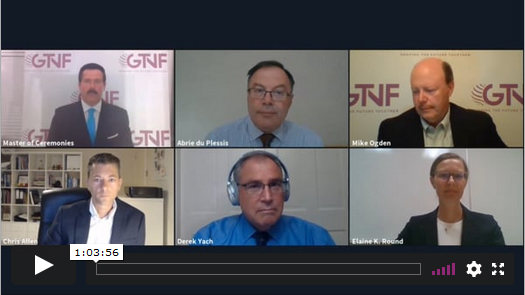Comparative Regs


The first panel discussion in the GTNF’s Asia time zone compared nicotine regulations around the world. Chris Allen, chief scientific officer at Broughton Nicotine Services, noted that regulation should be driven by sound science, not politics. “That is not always the case,” he said. Regulations, he added, should also be progressive. “They should allow innovation and have the ability to evolve,” he said. “If today’s aviation regulations were in place 100 years ago, air travel as we know it now may not have been possible.”
Moderated by RAI Services’ senior vice president of scientific and regulatory affairs, Mike Odgen, the panel explored the question of who is getting regulation right and who could do better. A consensus emerged that while no one was doing everything correctly, some regulatory bodies were doing a better job than others.
Citing 7 million tobacco-related deaths annually worldwide, Derick Yach, president of the Foundation for a Smoke-Free World (FSFW), said the goal of regulators should be to reduce the harm caused by tobacco as quickly as possible. “Governments are failing us,” he said, before singling out some “green shoots” of decent policy decisions. Yach pointed to the EU’s decision to exclude tobacco harm reduction (THR) products from its recently enacted ban on menthol cigarettes; the U.K.’s integration of THR into cessation at the clinical setting and the U.S. FDA’s decision to grant modified-risk orders to IQOS and general snus.
“Yet the World Health Organization, which should be putting it all together, is making little progress,” he noted. According to Yach, THR is part of the definition of tobacco control. The concept featured prominently when work started on the Framework Convention for Tobacco Control (FCTC). “Instead, we are hearing calls for bans on THR products in low-[income] and middle-income countries where the health consequences of combustible products are the harshest,” he lamented.
Trade law consultant Abrie Du Plessis urged tobacco and vapor companies to share their input as the EU starts evaluating novel tobacco products in preparation for its next Tobacco Products Directive (TPD). By May 2021, the EU is required to publish a report on novel tobacco products and propose amendments to the TPD. Enacted in 2014, the current directive does not address the harm reduction potential of such products. The rapporteurs will be looking into the impact of novel products on uptake among young people and nonsmokers and their contribution to cessation, among other issues.
Whatever new regulations the EU adopts may reverberate beyond the single market. According to Du Plessis, the upcoming report is required to consider rules at the international level. However, the Conference of the Parties to the FCTC, which was scheduled to take place this month in the Netherlands, has been postponed to November 2021. As a result, the sequence of events has been overturned; the FCTC will meet after the EU report. “This means the EU may lead the FCTC rather than the other way around,” says Du Plessis.
The panelists agreed that the regulatory processes around the world were too sluggish considering the tobacco-related mortality and morbidity. “If smoking wasn’t killing the number of people it is, it would probably be justified to go about this rulemaking in a very leisurely way,” said Yach. He contrasted the glacial pace for tobacco to the Covid-19 response where “every rule in the book is stripped because this is a fast-moving pandemic.”
“Yet there is no difference between the two except in timing,” said Yach, referring to the death tolls extracted by tobacco use and the coronavirus. “If we took the Covid-19 approach, the goal should be to strip away the regulatory nonsense to get lifesaving products into the hands of people in the quickest, safest possible way. Then we would see progress at lightning speed rather than what is now a trickle.”
